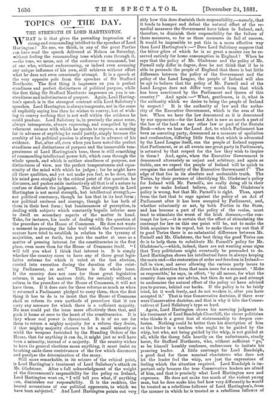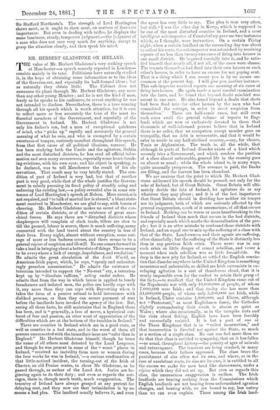TOPICS 014 1 THE DAY.
THE STRENGTH IN LORD HARTINGTON.
WHAT is it that gives the pervading impression of a strong and commanding intellect to the speeches of Lord Hartington ? No one, we think, in any of the great Parties can have read the speech delivered at Nelson on Saturday, without feeling the commanding tone which runs through it, —the tone, we mean, not of the endeavour to command, but of one who, without endeavouring, or indeed even assuming any unique influence of his own, still achieves without effort what he does not even consciously attempt. It is a speech at the very opposite pole from the speeches of Sir Stafford Northcote. The first thing it impresses on you is perfect steadiness and perfect distinctness of political purpose, while the first thing Sir Stafford Northcote impresses on you is un- steadiness and indistinctness of purpose. Again, Lord Harting- ton's speech is in the strongest contrast with Lord Salisbury's speeches. Lord Hartington is always temperate, not in the sense of explicitly saying less than he wishes to convey, but of wish- ing to convey nothing that is not well within the evidence he could produce. Lord Salisbury is, in precisely the same sense, always intemperate, always expressing, and compelled by the vehement animus with which he speaks to express, a meaning far in advance of anything he could justify, simply because the acerbity of his political passion is always far in advance of his evidence. But, after all, even when you have noted the perfect steadiness and distinctness of purpose and the immovable tem- perateness of Lord Hartington's tone, there is still something of commanding intellectual power left, which runs through the whole speech, and which is neither steadiness of purpose, nor distinctness of view, nor the perfect temperateness and equa- nimity of the mind with which he judges ; for he might have all these qualities, and yet not make you feel, as he does, that his mind goes straight to the critical point of the question he discusses, and pushes aside instinctively all that is of a nature to confuse or disturb the judgment. The chief strength in Lord Hartington is not moral strength, but intellectual strength,— not political constancy, though he has that in its best form ; nor political coolness and courage, though he has both of them in their best form ; but luminousness of perception, in dealing with subjects which constantly beguile inferior men to dwell on secondary aspects of the matter in hand. Take, for instance, his mode of dealing with the question of the procedure of the House of Commons. He does not waste a moment in pursuing the false trail which the Conservative orators have tried to establish in relation to the tyranny of majorities, and so forth, but puts the matter at once as a matter of pressing interest for the constituencies in the first place, even more than for the House of Commons itself. "I will tell you what I think that interest is. It is simply whether the country cares to have any of those great legis- lative reforms for which it voted at the last election, carried into execution during the duration of the exist-
ing Parliament, or not." There is the whole issue. If the country does not care for these great legislative reforms, it may let matters drift, for certainly without a reform in the procedure of the House of Commons, it will not have them. If it does care for these reforms as much as when it returned a Parliament pledged to carry them, then the first thing it has to do is to insist that the House of Commons shall so reform its own methods of procedure that it can carry any measure for which there is a sufficient majority. No man could put the issue more effectively than that, and push it home at once to the heart of the constituencies. It is they whose real power is threatened. It is of no use for them to return a mighty majority for a reform they desire, if that mighty majority chooses to let a small minority so wield the weapons furnished by the Standing Orders of the House, that for anything it can do, it might just as well have been a minority, instead of a majority. If the country wishes to have its general elections mean anything, it must insist on brushing aside these contrivances of the few which disconcert and paralyse the determination of the many.
Still more remarkable, in its seizure of the critical point, is Lord Hartington's treatment of Lord Salisbury's attack on Mr. Gladstone. After a full acknowledgment of the weight of the Government's responsibility for the policy on Ireland, Lord Hartington went on, " I will tell you what, if anything can, diminishes our responsibility. It is the reckless, the heated accnsations of our political opponents, to which we have been subjected," AO Lord Hartington points out very.
ably how this does diminish their responsibility,—namely, that it tends to hamper and defeat the natural effect of the re- medial measures the Government have taken in Ireland, and,. therefore, to diminish their responsibility for the failure of those measures, so far as those measures do fail of success, It would be impossible to put this in a more effective way than Lord Hartington's :—" Does Lord Salisbury suppose that the bitter gibes of which he is so great a master can be re- served entirely for home consumption in England ? When he says that the policy of Mr. Gladstone and the policy of Mr.. Parnell only differ in degree, does he not think that if he is able to persuade the people of England that there is but little difference between the policy of the Government and the policy of the Land League, the people of Ireland will also be apt to believe that the policy of Mr. Parnell and of the Land League does not differ very much from that which has been sanctioned by the Parliament and Queen of this. country ?" And again :—" What, gentlemen, is it, what is. the authority which we desire to bring the people of Ireland
to respect ? It is the authority of law and the autho- rity of the Executive Government, which is the arm of the law. When we hear the law denounced as it is denounced by our opponents—for the Land Act is now as much a part of the law of the land as any other law or part of the Statute Book—when we hear the Land Act, to which Parliament has been an assenting party, denounced as a measure of spoliation and confiscation, differing little from that which is advocated by the Land League itself, can the people of Ireland suppose that Parliament, or at all events one great party in Parliament, is actuated by that respect for the law they wish to inspire in them ? And, again, when the Executive Government is denounced alternately as unjust and arbitrary, and again as feeble, can we expect the people of Ireland will be quick to- recognise the authority of the Executive Government ?" The edge of that lies in its absolute and undeniable truth. The Tories, by their pretence of identifying Mr. Gladstone's policy for Ireland with Mr. Parnell's, are really doing all in their power to make Ireland believe, not that Mr. Gladstone's. policy is wrong, but that Mr. Parnell's is right. Thus, apart from the fact that to rage against the policy of an Act of Parliament after it has been accepted by Parliament, and, whether reluctantly or not, by both Parties in the State, and has become a part of the policy of the realm, must tend to stimulate the worst of the Irish diseases,—the con- tempt for law,—it is certain that the effect of stimulating the contempt for law on this one point will be, not to make the Irish acquiesce in its repeal, but to make them cry out that if to good Tories there is no substantial difference between Mr_ Parnell and Mr. Gladstone, the best thing the good Tories can do is to help them to substitute Mr. Parnell's policy for Mr. Gladstone's,—which, indeed, there are not wanting some signs that Tory politicians might eventually be persuaded to do. Lord Hartington shows his intellectual force in always keeping the main end—the restoration of order and freedom in Ireland— full in view, and never allowing the. various party issues to divert his attention from that main issue for a moment. ' Make us responsible,' he says, in effect, by all means, for what the• country does upon our advice, but then do not go and attempt to undermine the natural effect of the policy we have advised, you to pursue, behind our backs. If the policy is to be fairly tried, let it work freely, and do not weaken it, after you have accepted it.' That is true Conservative doctrine, if there ever were Conservative doctrine, and that is why it hits the Conser- vatives of Lord Salisbury's type so hard.
Again, Lord Hartington shows his unerring judgment in, his treatment of Lord Randolph Churchill, the clever politician who thinks it a great feat of statesmanship to deepen con- fusion. Nothing could be better than his description of him as the leader in a tandem who ought to be guided by the whip, but who, not being guided by the whip, is not guided at all, while the thong falls heavily on the unfortunate, steady horse, Sir Stafford Northcote, who, without sufficient " go," as he himself humbly confesses, endeavours to imitate his prancing leader. A little contempt for Lord Randolph, a good deal for those nominal charioteers who dare not let the leader feel the whip, are just the expressions of feeling which the situation required. Lord Randolph is im- portant only because the true Conservative leaders are afraid of him, and that is precisely what Lord Hartington sees and expresses. He does not make too much of the violent young man, but he does make him feel how very differently he would be treated as a rebellious follower of Lord Hartington's, from the manner in which he is treated as a rebellious follower of Sir Stafford Northcote's. The strength of Lord Hartington shows most, as it ought to show most, on matters of first-late importance. But even in dealing with trifles, he displays the same luminous, steady, temperate judgmert,—the judgment of a man who does not care very much for anything, except to grasp the situation clearly, and then speak his mind.







































 Previous page
Previous page